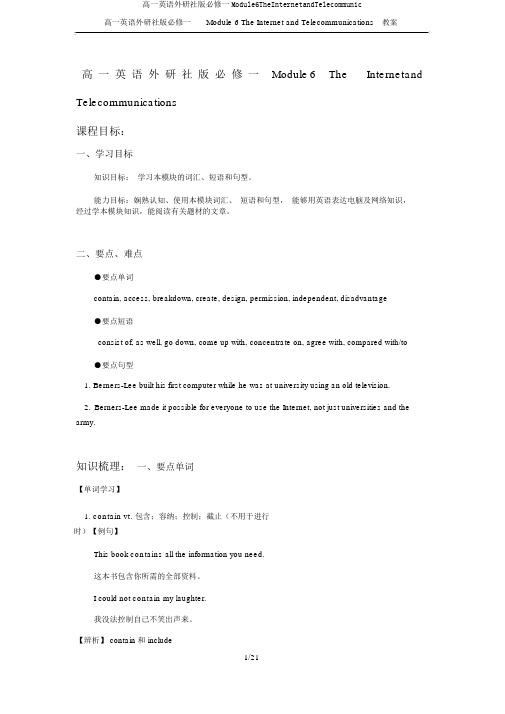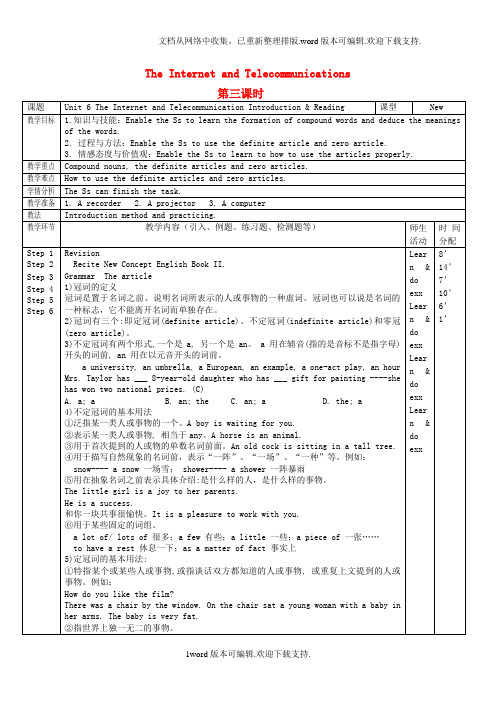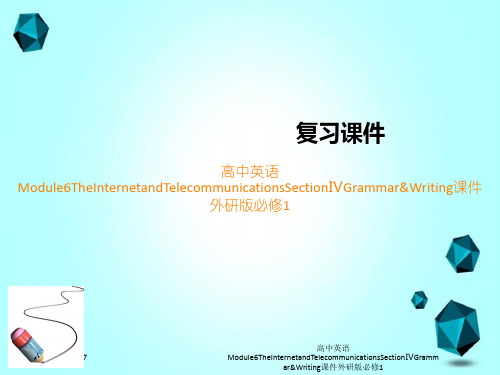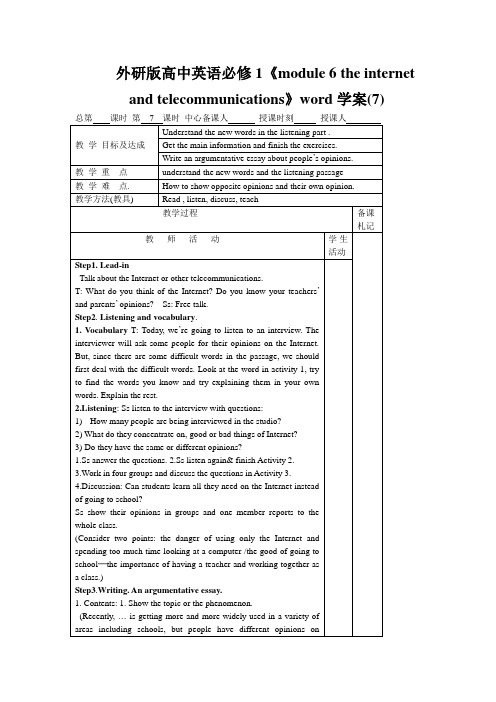高中英语 Module 6《The Internet and Telecommunications》Grammar教案3 外研版必修1
高中英语module6introductionandvocabulary教案外研版

Module 6 The Internet and TelecommunicationsIntroduction and VocabularyTeaching objectives:1. To arouse the students’ interest in learning about the computer and the internet.2. To help the students grasp the words and phrases about the two topics.3. To improve the students’ speaking ability by talking, discussing and listening.4. To educate them to look at the Internet and modern equipment of telecommunicationsdialectically.Teaching importance:1. To train and enhance the students’ ability of sp eaking.2. To master the vocabulary about the computer and the Internet.Teaching difficulties:1. How to enhance their speaking in a large-scale class.2. Some new and useful vocabularies about the topic.Teaching methods:Group work / task-based approach / student-centred approachTeaching aids:A computer, a projector, a blackboard and a tape recorder.Teaching procedures:Step I Greetings and Introduction1. Lead in the new lesson with a word game.Give the students several groups of words and ask them to pick out a different one and state the reason.a. student doctor lawyer artist professor(student is not a profession)b. chair sofa table stool bench(table is not for sitting)c. monitor mouse keyboard printer CD-ROM(printer is not a necessary part of a computer)d. homepage screen website Word2000 Windows(screen is not software / it is hardware)2. Explain the difference between hardware and software, if necessary.3. A competition of recognizing the parts of the computer.Divide the whole class into 2 groups, invite a student from each group to the front and write down the words that the other students explain.CD-ROM mouse keyboard hard disk screen monitorStep II Vocabulary1. The students write the words they prepare on the Bb.2. Explanation and comments.3. Practise the new words in various ways.Step III DiscussionWhat can they do with the computer and the Internet?use a computer for school work/ play computer games/ send emails/ surf the web for fun/ download music and films/ take part in chat groups/ look at photos/ buy things…Step IV ListeningHow does Du Juan use the computer and the Internet? (Guess and listen)1. Mrs Wu is discussing her daughter with her husband. F2. Mrs Wu is worried because Du Juan spends a lot of time chatting with strangers on ICQ. T3. Du Juan was one of the top students in her class but she isn’t now. T4. Du Juan has made some strange friends online. FWhat conclusion can you draw from the listening material?Every coin has two sides.Step V Homework1. Download one of your favourite song on the Internet.2. Preview the reading part of this module.。
高中英语Module6TheInternetandTelecommunications第二课时教案外

The Internet and Telecommunications第二课时课题Unit 6 The Internet and Telecommunication Introduction & Reading课型New教学目标1.知识与技能:Enable the Ss to talk about the Internet and the World Wide Web.2.过程与方法:Master some phrases about Internet and World Wide Web.3.情感态度与价值观:Enable the Ss to learn to talk about the Internet and the World Wide Web.教学重点Learn the development of the In ternet, the World Wide Web and the text massages and emoticons.教学难点Help the Ss to tal k about the Internet and Telecommunications.学情分析The Ss can finish the ta sk.教学准备1. A recorder2. A projector3. A computer教法1. Look at some pictures to learn some new words.2. Individual, pair or group work to make every student work in class.教学环节教学内容(引入、例题、练习题、检测题等)师生活动时间分配Ste p 1Ste p 2RevisionRecite the passage My new teacherRecite New concept English Book II.Reading1. Para 2(1) Answer the questionsDid the universities start using the Internet at the same time as the army? If not, whichearlier?No, they didn't. The army started earlier.(2) [经典回放]①Do you have any idea ___ is actually going on in the classroom?A. thatB. whatC. asD. which②Along with the letter was his promise ____ he would visit this coming Christmas.A. whichB. thatC. whatD. whether③The disc digitally ____ in the studio, sounded fantastic at the party last night.A. recordedB. recordingC. to be recordedD. having recorded④It’s hard ____ him ___ change his mind.A. of you to make; toB. for you to make; /C. For you to make; toD. of you making;/2. Para 31) Check the following sentences true or false.(1) The World Wide Web is a computer network. ( )(2) It allows computer users to access information from millions of websites via the Internet.( )(3) At the moment about 80 percent of web traffic is in Chinese. ( )(4) The World Wide is a computer network that allows computer users to access informationfrom millions of websites via the Internet. ( )2) [经典回放]①Linda worked for the Minnesota Manufacturing and Mining Company, _____ as 3M.A. knowingB. knownC. being knownD. to be known②He is known _____ the police _____ a criminal.A. to; toB. as; forC. to; asD. by; toRead &doexcise10’34’s be known for 因……而出名; be known by 根据……而得知Ste p 33) [辨析] allow sb to do sth, allow doing sth.和be allowed to do sth4) [辨析] allow, permit & let(1) allow 表示默许,允许,准许尽管是不允许的,护士还是让那些看望者待到过了医院规定的探病时间。
外研版高中英语必修1module 6 the internet and telec

课题: Module 6 Listening and Writing 总第 课时 第 7 课时 中心备课人 讲课时刻 讲课人
教 学 目标及达成 Understand the new words in the listening part . Get the main information and finish the exercises. Write an argumentative essay about people’s opinions. 教 学 重 点 understand the new words and the listening passage 教 学 难 点. How to show opposite opinions and their own opinion. 教学方法(教具) Read , listen, discuss, teach 教学过程 备课 札记 教 师 活 动 学生活动
Step1. Lead-in Talk about the Internet or other telecommunications. T: What do you think of the Internet? Do you know your teachers’ and parents’ opinions? Ss: Free talk. Step2. Listening and vocabulary. 1. Vocabulary T: Today, we’re going to listen to an interview. The interviewer will ask some people for their opinions on the Internet. But, since there are some difficult words in the passage, we should first deal with the difficult words. Look at the word in activity 1, try to find the words you know and try explaining them in your own words. Explain the rest. : Ss listen to the interview with questions: 1) How many people are being interviewed in the studio? 2) What do they concentrate on, good or bad things of Internet? 3) Do they have the same or different opinions? answer the questions. listen again& finish Activity 2. in four groups and discuss the questions in Activity 3. : Can students learn all they need on the Internet instead of going to school? Ss show their opinions in groups and one member reports to the whole class. (Consider two points: the danger of using only the Internet and spending too much time looking at a computer /the good of going to school─the importance of having a teacher and working together as a class.) . An argumentative essay. 1. Contents: 1. Show the topic or the phenomenon. (Recently, … is getting more and more widely-used in a variety of areas including schools, but people have different opinions on whether the Internet can take the place of school.) 2. Show opposite opinions.(Some think that we can learn all we need on the Internet. There are a number of reasons for this: Firstly,… Secondly…Besides,…)(While others consider…very important. On the one hand, …On the other, …) 3. Show your own opinions.(In my opinion, I think … Every coin has two sides. We’d better …) 2. Other useful expression: It’s very important to … It would be very difficult to …What’s more, …However, … I don’t agree with this opinion… Step4. Homework: write an essay following the outline. Step5. 板书设计 How to assess an argumentative essay: 1. A clear structure. 2. Meaningful and persuasive reasons. 3. Proper own . Proper conjunctions and adverbs, 导学后记
高一英语外研社版必修一Module6TheInternetandTelecommunic

高一英语外研社版必修一Module 6 The Internet and Telecommunications教案高一英语外研社版必修一Module 6 The Internet a nd Telecommunications课程目标:一、学习目标知识目标:学习本模块的词汇、短语和句型。
能力目标:娴熟认知、使用本模块词汇、短语和句型,能够用英语表达电脑及网络知识,经过学本模块知识,能阅读有关题材的文章。
二、要点、难点●要点单词contain, access, breakdown, create, design, permission, independent, disadvantage●要点短语consist of, as well, go down, come up with, concentrate on, agree with, compared with/to●要点句型1.Berners-Lee built his first computer while he was at university using an old television.2.Berners-Lee made it possible for everyone to use the Internet, not just universities and the army.知识梳理:一、要点单词【单词学习】1.contain vt. 包含;容纳;控制;截止(不用于进行时)【例句】This book contains all the information you need.这本书包含你所需的全部资料。
I could not contain my laughter.我没法控制自己不笑出声来。
【辨析】 contain 和 include1)contain 往常用来指某种容器中盛有某物,还指某种物质中含有某成分或含有其余物质。
外研版高中英语必修1module6theinternetandtelecommunications第

文档从网络中收集,已重新整理排版.word 版本可编辑.欢迎下载支持.
The earth is biggest than the moon, but smaller than the sun. the sky; the universe; the atmosphere ③用在单数可数名词之前, 表示某一类人或事物。如: The lion is more fierce than the wolf. The compass was invented in ancient China. ④常用在乐器的名称之前。如: play the violin/piano ⑤用在某些专有名词前:the People’s Republic of China, the Great Wall, the White House; 在江河、山脉、海洋、湖泊、群岛的名词之前: the Changjiang River; the Yellow River; the Salt Lake ⑥在姓氏的复数形式前加定冠词, 表示一家人。
snow---- a snow 一场雪; shower---- a shower 一阵暴雨
⑤用在抽象名词之前表示具体介绍:是什么样的人,是什么样的事物。
The little girl is a joy to her parents.
He is a success.
和你一块共事很愉快。It is a pleasure to work with you.
How do you like the film?
There was a chair by the window. On the chair sat a young woman with a baby in
her arms. The baby is very fat.
高中英语Module6TheInternetandTelecommunicationsSectio

13
3.以“可数名词+介词(短语)”构成的合成名词变复数时,
把前面的名词变成复数。
passer-by→passers-by
过路人
4.以“动词/过去分词+副词”构成的合成名词变复数时,
在词尾加 s。
grown-up→grown-ups
成年人
高中英语
2021/4/17
Module6TheInternetandTelecommunicat ionsSectionⅣGrammar&Writing课件外
高中英语
2021/4/17
Module6TheInternetandTelecommunicat ionsSectionⅣGrammar&Writing课件外
6
一、合成词 把两个或两个以上的词合成一个新词,这种构词法叫作合成 构词法。常见合成词有合成名词、合成形容词和合成动词等几种 类型。
高中英语
纸袋
2.以 man 和 woman 为前缀的名词变成复数时,前后两个名
词都变成复数。
man-doctor→men-doctors 男医生
woman-cook→women-cooks 女厨师
高中英语
2021/4/17
Module6TheInternetandTelecommunicat ionsSectionⅣGrammar&Writing课件外
形容词+现在 分词
副词+现在分 词
名词+过去分 词
good-tempered 好脾气的 noble-minded 高贵的;高尚的 good-looking 长得好看的 easy-going 容易相处的 hard-working 努力工作的 far-reaching 深远的;广泛的 heartbroken 心碎的 state-owned 国有的
外研版高中英语必修1《module 6 the internet and telecommunica

教学重点
understand the new words and the listening passage
教学难点.
How to show opposite opinions and their own opinion.
教学方法(教具)
Read , listen, discuss,teach
教学过程
备课
பைடு நூலகம்札记
教师活动
学生活动
Step1. Lead-in
Talk about the Internet or other telecommunications.
T: What do you think of the Internet? Do you know your teachers’and parents’opinions?Ss: Free talk.
(Considertwo points: the danger of using only the Internetandspending too much time looking at a computer/the good of going to school─the importance of having a teacher andworking together as a class.)
2.Listening:Ss listen to the interview with questions:
1)How many people are being interviewed in the studio?
2)What do they concentrate on, good or bad things ofInternet?
外研版高中英语必修一Module 6The Internet and Telecommunicationsgrammar 学案

必修1 Module6 grammar学案-冠词(一)考纲要求考纲规定,冠词考查基本用法,包括定冠词与不定冠词,不定冠词a与an的区别;不用冠词的情况;习语中的冠词;特指与泛指等。
(二)命题导向冠词规则的灵活运用是高考命题的一个热点,几乎每年高考题的单项选择或完形填空都有涉及冠词的题目,不定冠词和定冠词的一些特殊用法,习惯用法及不用冠词的情况是高考重点考查的知识点。
一、冠词的分类:冠词是一种虚词,用在名词或名词词组的前面,表示名词是特指还是泛指。
冠词可分为不定冠词和定冠词两种形式。
不定冠词有 a/an定冠词有 the其中, a 用在发音以辅音开头的名词之前, 而 an 则用在发音以元音开头的名词之前。
二、不定冠词的用法:1.表示某一类人或某事物中的任何一个,经常用在第一次提到某人或某物时,用不定冠词起介绍作用,表示一个。
1)I gave him a book yesterday. 我昨天给了他一本书。
2)I am reading an interesting story . 我在读一本有趣的故事书。
2.表示人或事物的某一种类, 强调整体, 即以其中的一个代表一类。
1)A horse is useful to mankind. 马对人类有用。
2)A bird can fly. 鸟会飞。
3)A steel worker makes steel. 炼钢工人炼钢。
3.不定冠词用在事物的"单位"前,如时间, 速度, 价格等意义的名词之前,表示 "每一"。
1)We often go to school two times a day.我们常常一天两次去学校。
2) The potato is sold at about 30 fen a jin. 土豆卖三毛钱一斤。
4.不定冠词用来指某人某物,但不具体说明任何人或任何物。
1)A boy came to see you a moment ago. 刚才有一个小孩来找你。
- 1、下载文档前请自行甄别文档内容的完整性,平台不提供额外的编辑、内容补充、找答案等附加服务。
- 2、"仅部分预览"的文档,不可在线预览部分如存在完整性等问题,可反馈申请退款(可完整预览的文档不适用该条件!)。
- 3、如文档侵犯您的权益,请联系客服反馈,我们会尽快为您处理(人工客服工作时间:9:00-18:30)。
Teaching plan Module Six The Internet and Telecommunications
Teaching Aims:
1. Knowledge and Skill
a. Be able to master the key words and expressions, read the text fluently and
get to know something about the Internet and telecommunications.
b. Master the basic usages of the definite article and zero article.
c. Train the students listening, speaking, writing and reading ability.
2.Emotion and Values
a. To raise students’ interests in Internet and form the attitude towards the
usage of the Internet
b. To teach the students to use the resources in a proper way and avoid indulging
in electronic games.
Difficulties and Importance:
a. To make the students understand and grasp the vocabulary and knowledge related
to Internet and telecommunications.
b. To enable the students to know the usage of definite article and zero article
c. Enable the Ss to recognize the usage of compound nouns.
Teaching Method:
a. Task-based methodology
b. Communicative Approach
Teaching Procedures:
Period 3
Teaching Content: Grammar 1
Listening and Vocabulary
Step 1 Presentation
Model: keyboard Type 1: one word
CD-ROM Type 2: two words with “-” (hyphen)
Mobile phone Type 3: two words
Ask the students to finish the activity as the following steps:
Step3
1
Have the students look at these compound words, understand its three types
and classify them
2
Ask the students to work in groups to classify them, recall and write out
the compound words according to their types.
3
The teacher counts up the number and see which group write the most compound
nouns.
Step 2. Practice
a. Decide what type these words are.
Hardware high-speed computer system search engine software
b. Make compound nouns, using words from the boxes. Use words in the left hand box
more than once, if you can.
hard key
web net
note soft
Step 3 Listening and vocabulary
a. Match the following words with their definitions.
concentrate definite enjoy fantastic favourite useful
independent make sure reason studio terrible
b. Listen to three people answering the interviewer. Choose their opinions from
this list.
1. Ann, the teacher, thinks that ________.
A. everything on the Internet is useful for students.
B. The Internet is a bad thing
C. It’s important to help students find useful sites on the Internet
2. Tom, the student, thinks that______.
A. the Internet is the only place to study
B. the internet is a good place to study
C. it’s important to use the Internet as much as possible
3. Pat, Tom’s mother, thinks that_____.
A. Tom should only study from books
B. he spends too much time reading about football on the Internet
C. using the Internet is a bad thing
Step 4 Discussion
Work in groups and discuss the following questions.
1. Concentrate on the good things about the Internet. What are the good things about
the Internet?
2. Do you think the Internet is fantastic? What other adjectives would you use to
describe it?
3. What is the best reason for using the Internet at school?
4. What is the most useful thing you’ve ever found on the Internet?
Homework: Finish the exercise 1,11,12,13 on page 97, 101
board site book traffic
browser ware disk word
pad work
